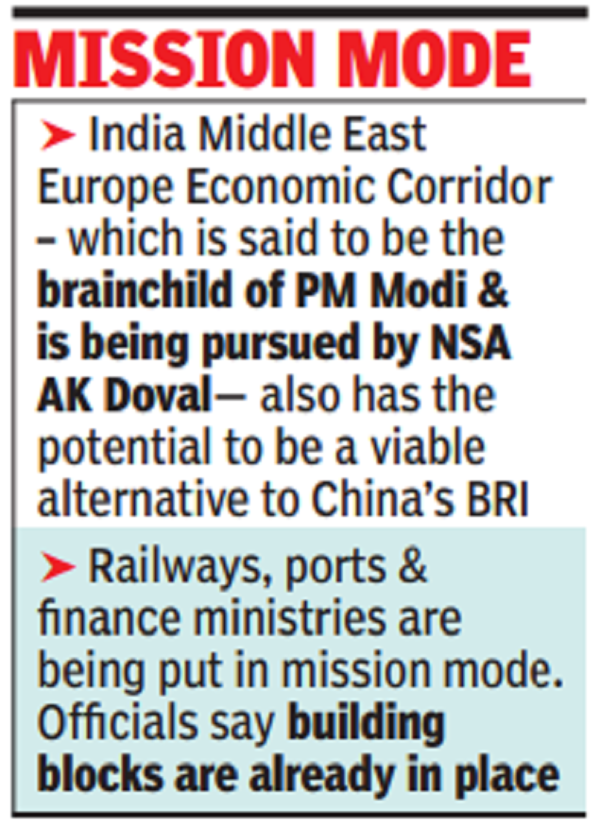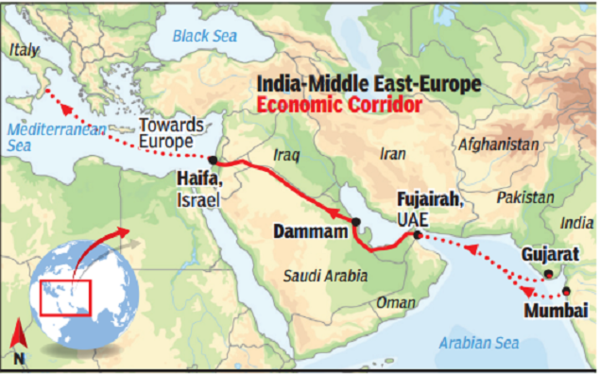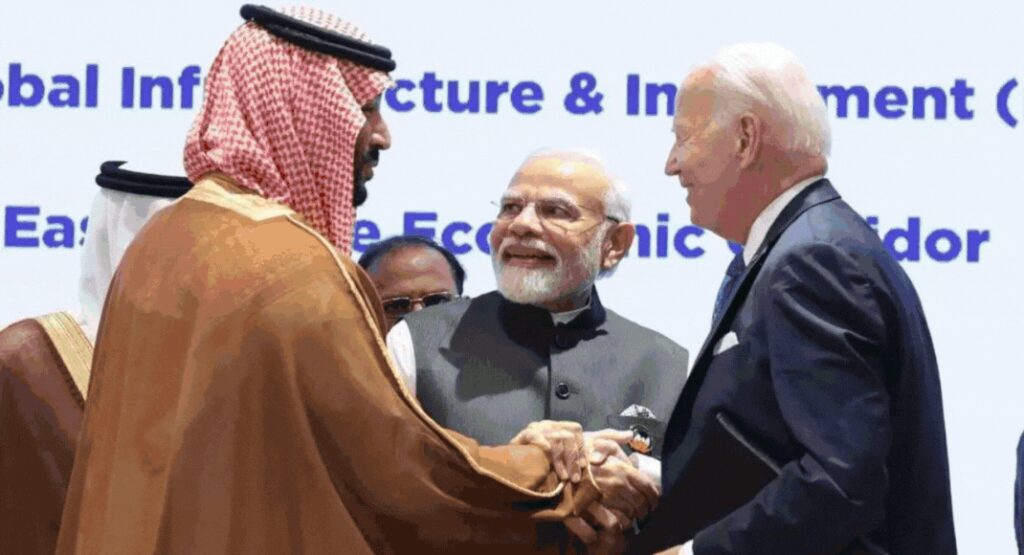[ad_1]
By successfully pushing for the India Middle East Europe Economic Corridor (IMEEC) and getting influential partners, such as the UAE, Saudi Arabia, the US and European nations such as Germany, France and Italy, the Modi government appeared to have succeeded in splicing multiple objectives.
As a result of the rare confluence, it can hope to enhance economic opportunities for the country by finding new markets for its goods, experts said. Once completed, the ambitious transnational infrastructure project – which is said to be the brainchild of PM Narendra Modi and was pursued by NSA AK Doval— also has the potential to be a viable alternative, although this part is something that government functionaries are loath to acknowledge even in private, to the Belt and Road Initiative— the grand connectivity scheme spanning multiple contracts with which China had hoped to wow the global imagination.

With the part of getting foreign partners, some of whom were initially sceptical, on board over, the government has put a premium on its timely execution, setting a deadline of three-four years for completion. Although it may seem stiff in view of the hurdles that transnational infrastructure projects, especially those related to transport, typically run into, the Modi government considers it to be a realistic deadline.
Railways, ports and finance ministries are being put in mission mode and what is boosting confidence, as officials said, is that the building blocks are already in place, with only part of the actual infrastructure to be built.
The way the project is currently conceived—the initial 1,600-1,800 km will be the sea link that will connect ports on India’s west coast with Fujairah in the UAE—one of the key tasks before the architects of the project is to upgrade the Fujairah port.
From there, the goods are proposed to be moved by train to Haifa in Israel, and around a quarter of the rail link – around 700 km of the 2,600 km – needs to be built, most of it in Saudi Arabia, not a difficult proposition, according to those involved. The kingdom has the money and laying rail line through desert terrain may not be difficult.
According to estimates available with the government, overall investment required in the project is expected to be of the order of $10-12 billion with nothing significant required to be done in India.
This is quite unlike the ambitious BRI, which is now facing multiple challenges – from resistance within countries, including in China’s key allies such as Pakistan, to financing woes due to the approach taken by Beijing in sanctioning loans.

“For us, the existing railway lines and the road network will feed the traffic,” said an official. What India, however, needs to do is upgrade its logistics as a key element of IMEEC is standardisation – from containers to equipment at the ports and in railway yards. The idea is to seal the containers in, say, Kolkata so that they can be opened in Rome or London, key partners of the project.
This will also require some tweaks to the customs procedures so that the entire process, which is set to be less expensive and faster than road transport, is seamless and eventually goods move from western ports such as JNPT in Mumbai to Haifa in two-three days.
The process is also expected to upgrade domestic infrastructure with Indian companies also seen to be in the race to execute some of the contracts in West Asia where the port upgrade and railway lines are to be built.
Officials said that what has been a glue for all the countries is the immense trade and business possibilities that it offers. But a crucial aspect is that every country will undertake the investment in its sovereign territory and there are no hidden funding requirements like in BRI. Every country whose infrastructure will be used will be entitled to levy a fee for transporting goods, an official said.
It was Prime Minister Narendra Modi’s imagination. He asked me to pursue and execute it with speed and requisite confidentiality.
Ajit Doval
Mega geo-political initiative
Putting together the project however, was far more challenging. While India was always averse to BRI, others including the US and Japan did not see it as a threat initially. It was only much later that the West saw China’s motives and the threat it posed to them.
While BRI was traversing the globe, India was working on other initiatives such as I2U2 (India, Israel, UAE and US), that sought to build infrastructure and ensure maritime and food security.
It was sometime in April-May this year that National Security Advisor A K Doval pitched Modi’s idea to his UAE counterpart Sheikh Tahnoon bin Zayed Al Nahyan, younger brother of the President of the UAE, and Prince Mohammad bin Salman, Crown Prince and Prime Minister of Saudi Arabia, at hush-hush meetings held at an undisclosed place. The focus was on confidentiality because of fear of sabotage. But it was not until a few months later that the idea was shared with the US and UK, who after deliberating for long, joined the effort, China’s expanding ambitions in West Asia, as reflected in the desire to be the peace-broker between Saudi Arabia and Iran, being the possible prompt.
Germany and France have since also enlisted themselves, boosting the appeal, viability and heft of what appears to be a first of its kind initiative by India. Italy’s entry was dramatic, with Giorgia Meloni indicating her preference for IMEEC over BRI.
“India-Saudi relations deepened under…” Smriti Irani joins National Day revels at Saudi Arabia Embassy
Doval is learnt to have worked overtime with Saudi Arabia, Israel as well as some of the European nations to bury their differences and get them on board. When contacted by TOI, Doval dismissed the suggestion of him playing a crucial role. “It was Prime Minister Modi’s imagination. He asked me to pursue and execute it with speed and requisite confidentiality,” said the NSA, declining requests for more details.
Getting all of them together could not have been an easy task. The US and Saudi Arabia were not on the best of terms after the murder of journalist Jamaal Khashoggi and Beijing had been working hard to insert itself into the breach. Saudis’ relations with the UAE were strained too.
Going forward, the idea is to link South East Asia as well, and if all goes well, even have some passenger trains running.
[ad_2]
Source link










More Stories
We can’t wait to face India in the final: Pat Cummins | Cricket News
Railways plans 3,000 additional trains in next 4-5 years to minimise number of waitlisted tickets | India News
Faridabad: Man dies after ‘falling from hotel room window’ while partying with friends